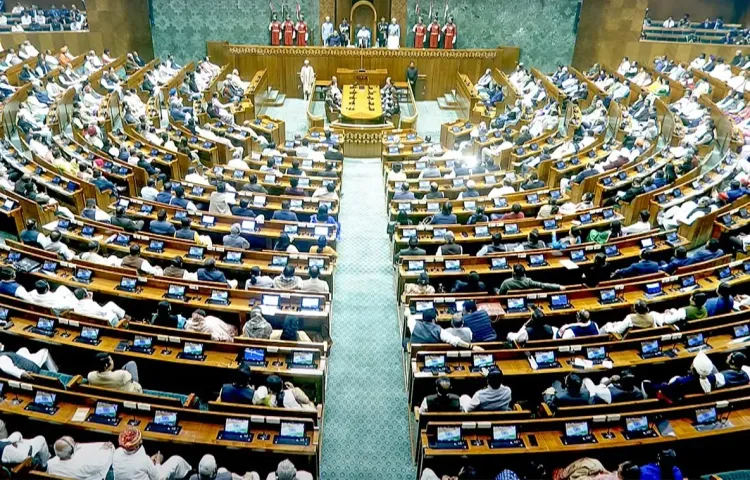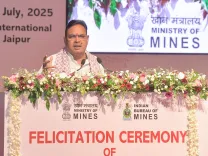Waqf Bill 2024: Initiative to Promote Inclusivity and Increase Property Revenue

Synopsis
Key Takeaways
- Inclusivity for marginalized communities in Waqf governance.
- Creation of separate boards for Aghakhani and Bohras.
- Improvement in the registration process of Waqf properties.
- Proposal for enhanced oversight and public trust.
- Potential increase in annual revenue from Waqf properties.
New Delhi, March 31 (NationPress) The appeal from Kerala Catholic Bishops' Council (KCBC) to all Members of Parliament representing Kerala to endorse the Waqf (Amendment) Bill 2024 introduced by the Central government has sparked renewed discussions regarding the significant advantages of this proposed legislation.
The Bill suggests reforms in Waqf governance aimed at resolving inefficiencies, legal disputes, and public concerns. It emphasizes that achieving inclusivity is vital for Waqf institutions to realize their intended goals and enhance their societal impact.
Understanding Waqf
A Waqf refers to the permanent allocation of movable or immovable property for religious or charitable purposes and is governed by the Waqf Act, 1995, overseen by State Waqf Boards and the Central Waqf Council.
There are currently 32 Waqf Boards across 23 states and 7 Union Territories, with Bihar and Uttar Pradesh having distinct Shia and Sunni Waqf Boards.
National Assets
Waqf Boards manage approximately 8.72 lakh properties covering 9.4 lakh acres throughout India, valued at around Rs 1.2 lakh crores. India holds the largest Waqf assets globally. Furthermore, the Waqf Board stands as the second-largest landowner in India after the Armed Forces and Indian Railways.
Out of these 8.72 lakh properties, only 1,088 have registered Waqf deeds, and 9,279 possess Ownership Rights Establishing (ORE) documents.
Interestingly, many Islamic nations lack Waqf properties. Countries like Turkey, Libya, Egypt, Sudan, Lebanon, Syria, Jordan, Tunisia, and Iraq do not maintain Waqfs. However, in India, Waqf Boards are not only the largest urban landowners but also have a legal framework protecting their interests.
New Legislation
On August 8, 2024, two bills—the Waqf (Amendment) Bill, 2024 and the Mussalman Wakf (Repeal) Bill, 2024—were introduced in the Lok Sabha to streamline the operations of the Waqf Board and ensure effective management of Waqf properties.
The Waqf (Amendment) Bill, 2024 aims to modify the Waqf Act, 1995 to address existing challenges in the regulation and management of Waqf properties. This Amendment seeks to enhance the administration of Waqf properties in India.
It intends to rectify the shortcomings of the previous legislation by implementing changes such as renaming the Act, updating definitions of Waqf, improving the registration process, and amplifying the role of technology in managing Waqf records.
The main goal of the Mussalman Wakf (Repeal) Bill, 2024 is to abolish the Mussalman Wakf Act, 1923, an outdated colonial-era law.
Key Features of the Waqf Bill 2024
In addition to acknowledging women and non-Muslims as stakeholders, the Bill emphasizes inclusivity in Waqf governance by incorporating marginalized Muslim communities.
It also suggests the creation of a separate board for the Aghakhani and Bohras communities and the inclusion of Pasmanda Muslims in decision-making processes within the Board.
The proposed greater inclusivity aims to avert monopolization, reinforce oversight, and build public trust.
Moreover, effective governance is expected to ensure that Waqf assets make significant contributions to education, healthcare, and economic empowerment.
The governance failures that led to mismanagement in the Board were highlighted by the Justice Rajinder Sachar Committee (2006), which reported that the annual income from 4.9 lakh registered Waqf properties generates only Rs 163 crore at a 2.7 percent return.
However, with effective and market-oriented utilization, these properties could potentially yield a return of Rs 12,000 crore annually at a 10 percent return (data from 2006).
Proposed Modifications to the 1995 Act
Formation of Waqf: The Waqf Act 1995 permits a Waqf to be formed through declaration, recognition based on long-term use (Waqf by user), or endowment when the line of succession ceases (Waqf-alal-aulad).
Nonetheless, the Waqf (Amendment) Bill, 2024 stipulates that only individuals practicing Islam for a minimum of five years can declare a Waqf and must own the property being declared.
This Bill eliminates Waqf by user, which allowed properties to be deemed as Waqf solely based on extended use for religious purposes.
Additionally, it specifies that Waqf-alal-aulad must not infringe on the inheritance rights of the donor's heirs, including women.
Power to Determine Property Status: The Act grants the Waqf Board the authority to investigate and establish whether a property is Waqf. The Bill removes this authority.
Appeals on Tribunal Orders: Under the Act, Tribunal decisions are final, and appeals against these decisions in courts are prohibited. The High Court can address matters at its discretion, based on an application from the Board or an aggrieved party.
The Bill eliminates provisions that grant finality to Tribunal decisions. Tribunal orders can now be appealed in the High Court within 90 days.
Central Government Powers: The Bill empowers the Central government to establish regulations regarding registration, publication of Waqf accounts, and dissemination of Waqf Board proceedings.
Under the Act, state governments may audit Waqf accounts at any time. The Bill empowers the central government to have these accounts audited by the CAG or a designated officer.









